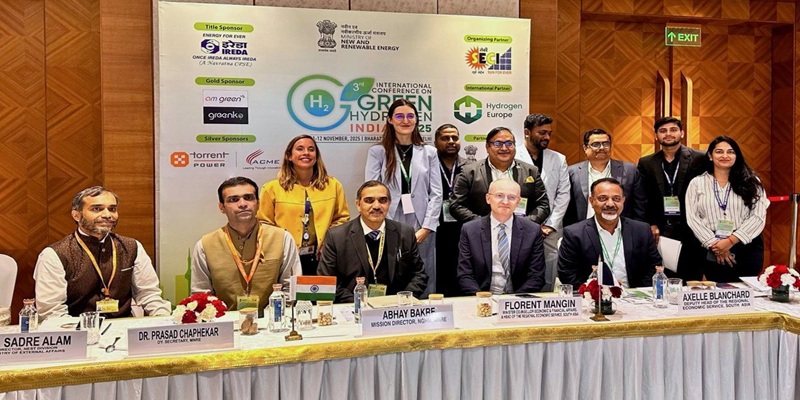Schedule a Call Back
IPF turns smart with SME
 Articles
Articles- Apr 01,24
In 1972-73, the India's economy grew by about 2 per cent compared to previous year with industrial sector registering a growth of only 4.5 per cent while agriculture production declining by 1.7 per cent

In 1972-73, the India's economy grew by about 2 per cent compared to previous year with industrial sector registering a growth of only 4.5 per cent while agriculture production declining by 1.7 per cent. Amid this, Industrial Products Finder (IPF) was launched in October 1972 when India was still a closed economy with restrictions on imported products, excessive regulations and bureaucratic control (the "Permit Raj" regime). During this period, IPF played a pivotal role in bridging the knowledge gap of the Indian industry by presenting latest products from across the world.
The 1980s marked the shift towards liberalisation with Maruti Udyog Ltd (erstwhile name of Maruti Suzuki India Ltd) being incorporated in 1981 as a joint venture partnership between the Government of India and Japan's auto major Suzuki. On December 14, 1983, the first Maruti car was handed over to the buyer by none other than the then Prime Minister, Indira Gandhi. Entry of Maruti kick-started the industrialisation in the country as the company was forced to develop local supply chain.
And then came the 1991 reforms that dismantled barriers like industrial licensing and reduced import tariffs. This resulted in rapid liberalisation exposing local industries to international competition while simultaneously presenting growth opportunities through collaboration with global companies. India also started witnessing a shift in its manufacturing dynamics. Companies started to diversify from traditional industries (like textiles, handicrafts, agro-based, etc) to engineered parts & components; thus widening India's manufacturing portfolio.
When the manufacturing sector was changing, IPF also kept on evolving.
Internationally, multinational companies in their quest to expand businesses latched onto the globalisation bandwagon while focusing on improving productivity by using modern machines. Shift was clear from manual to mechanical to automation. Introduction of computers, Internet and other kinds of electronics led to the Third Industrial Revolution (or digital revolution). This was followed by the next phase in the digitization of the manufacturing sector, Industry 4.0, which was driven by disruptive trends such as the rise of data and connectivity, analytics, human-machine interaction, and increased usage of robotics. Industry 4.0 enabled smart manufacturing via intelligent, connected factories.
Companies are now integrating cutting-edge technologies such as artificial intelligence (AI), robotics, and the Internet of Things (IoT) into its manufacturing processes. In an era marked by rapid technological advancements, manufacturing sector is undergoing transformative shifts. At the same time, Indian manufacturing sector’s stature in the world has increased with monumental changes in government policies and company strategies.
In line with these changes, Industrial Products Finder (IPF) - after serving the industry for the last 52 years - will now transform into Smart Manufacturing & Enterprises (SME) to fulfill the new needs of the manufacturers and widen its coverage of industrial segments. Through news, views and in-depth articles, SME will give a fresh perspective on every aspects of the manufacturing sector - from Products & Technologies to Manufacturing Policies to Business Strategies.
Though the look is new, our Commitment remains the same – i.e. to be a facilitator for your business growth. As we embark upon the New Journey, we are banking on your support to make "Smart Manufacturing & Enterprises" the voice of the modern Indian manufacturing sector.
We will look forward to your feedback and suggestions on the first edition of "Smart Manufacturing & Enterprises" to serve you better in the future.
economy
Industrial Products Finder
liberalisation
Maruti Udyog Ltd
Government of India
Suzuki
Prime Minister
Indira Gandhi
international competition
textiles
handicrafts
agro-based manufacturing sector
Third Industrial Revolution
cutting-edge technologies
artificial intelligence
Internet of Things
Smart Manufacturing & Enterprises
Related Stories
Electrical & Electronics

India’s Solar Waste May Reach 11 Million Tonnes by 2047
The country’s installed solar capacity has already crossed 85 GW, and with the target of 500 GW of renewable energy by 2030, waste volumes are expected to rise sharply in the coming decades.
Read moreAuto & Auto Components

Toyota, Honda Step Up Investments to Make India Auto Hub
Japanese carmakers boost India presence as they cut dependence on China
Read morePolicy Regulation

Global Manufacturing Rebounds as India, Thailand, Vietnam Lead Gains
Asia drives October’s global manufacturing upturn amid festive demand
Read moreRelated Products

Digital Colony Counter
INDUSTRIAL AUTOMATION & TECHNOLOGY CONSULTANCY
Rising Sun Enterprises supplies digital colony counter.
Robotic Welding SPM
INDUSTRIAL AUTOMATION & TECHNOLOGY CONSULTANCY
Primo Automation Systems Pvt. Ltd. manufactures, supplies and exports robotic welding SPM.

Heat Exchanger Scale Removal Compound -hesr-300
INDUSTRIAL AUTOMATION & TECHNOLOGY CONSULTANCY
Read more
Request a Quote
Hi There!
Now get regular updates from IPF Magazine on WhatsApp!
Click on link below, message us with a simple hi, and SAVE our number
You will have subscribed to our Industrial News on Whatsapp! Enjoy
















